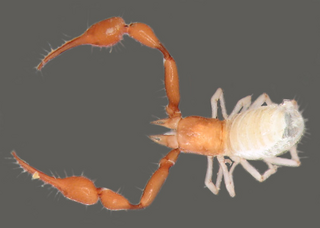
Arachnida is a class of joint-legged invertebrate animals (arthropods), in the subphylum Chelicerata. Arachnida includes, among others, spiders, scorpions, ticks, mites, pseudoscorpions, harvestmen, camel spiders, whip spiders and vinegaroons.

Pseudoscorpions, also known as false scorpions or book scorpions, are small, scorpion-like arachnids belonging to the order Pseudoscorpiones, also known as Pseudoscorpionida or Chelonethida.
Sororoditha hirsuta is a species of pseudoscorpion in the family Tridenchthoniidae.
Tridenchthonius africanus is a species of pseudoscorpion in the family Tridenchthoniidae.
Garypus titanius, the giant pseudoscorpion, is the largest species of pseudoscorpion—small, scorpion-looking creatures—in the world. Critically endangered, it is restricted to Boatswain Bird Island, a small rocky island off Ascension Island in the South Atlantic Ocean. Pseudoscorpions are venomous arachnids and are generally tiny—around 3 mm long. The giant pseudoscorpion, though, can grow to five times that size at 11 mm. It lives among seabird colonies, feeding mainly at night on smaller prey such as insects. It belongs to the Garypidae family.

Alireza Zamani is an Iranian arachnologist and taxonomist.

Syarinidae is a family of pseudoscorpions in the order Pseudoscorpiones. There are at least 20 genera and 110 described species in Syarinidae.
Syarinus is a genus of pseudoscorpions in the family Syarinidae. There are about six described species in Syarinus.
Illinichernes distinctus is a species of pseudoscorpion in the family Chernetidae.
Illinichernes is a genus of pseudoscorpions in the family Chernetidae. There are at least two described species in Illinichernes.
Microbisium brunneum is a species of pseudoscorpion in the family Neobisiidae.

Garypus californicus is a species of pseudoscorpion in the family Garypidae.
Hesperochernes is a genus of pseudoscorpions in the family of Chernetidae.
Chitrella is a genus of pseudoscorpions in the family of Syarinidae.

The Tooth Cave pseudoscorpion(Tartarocreagris texana) is a small cave-dwelling arachnid of the family Neobisiidae. The species was originally assigned to the genus Microcreagris, and then reassigned to Austalillocregris before arriving at its current genus, Tartarocreagris. The Tooth Cave pseudoscorpion has a small geographic distribution, known to occur in only two caves in Travis County, Texas. Additionally, it is tentatively identified in two nearby caves in Texas, but more research is necessary to accurately define the range where the species lives. There is little known about the biology, life cycle, and life history of the Tooth Cave pseudoscorpion due to a lack of research and study. Because of this, the Tooth Cave pseudoscorpion is listed on the IUCN Red List as data deficient. Under the Endangered Species Act, the Tooth Cave pseudoscorpion is listed as endangered. Recovery plans for the species focus mostly on preserving the karst ecosystem that the pseudoscorpions live in, especially including lessening human impacts on the environment.
Anysrius is a genus of pseudoscorpions in the Syarinidae family. It is endemic to the Australian state of Tasmania. It was described in 1998 by Australian arachnologist Mark Harvey. The genus name Anysrius is an anagram of its sister genus Syarinus.
Anysrius brochus is a species of pseudoscorpion in the Hyidae family. It is endemic to Australia. It was described in 1998 by Australia arachnologist Mark Harvey. The specific epithet brochus refers to the cheliceral teeth of the male.
Anysrius chamberlini is a species of pseudoscorpion in the Hyidae family. It is endemic to Australia. It was described in 1998 by Australia arachnologist Mark Harvey. The specific epithet chamberlini honours American arachnologist Joseph Conrad Chamberlin.





